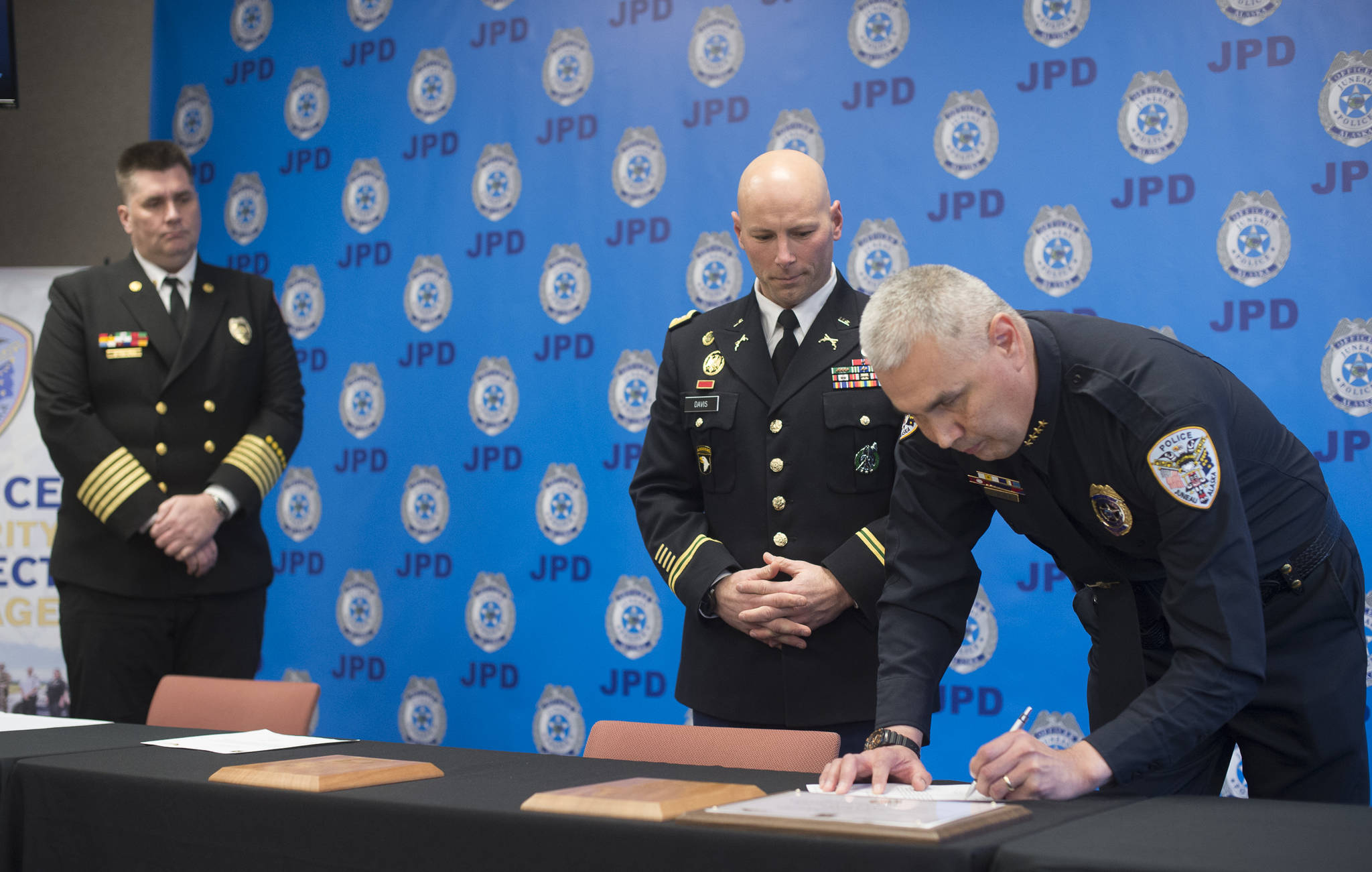About a year ago, a news article caught the eye of Juneau Police Department Deputy Chief David Campbell.
Campbell read a story about the Anchorage Police Department partnering with the U.S. Army in a program called Partnership for Youth Success (PaYS). The partnership helps connect Army personnel with employers after they leave the service.
JPD Chief Ed Mercer walked into Campbell’s office shortly after that. He had apparently also seen the news too.
“Why aren’t we doing this?” Mercer asked.
Soon afterward, an opportunity presented itself. Alaska Recruiting Company Commander Capt. Dana Schwartz, reached out to JPD and a conversation began. That back-and-forth culminated in a ceremony at Juneau’s police station on Wednesday where Mercer and Capital City Fire/Rescue Chief Rich Etheridge both signed the partnership with the U.S. Army’s PaYS Program.
Lt. Commander Mark A. Davis, the battalion commander for the Seattle Recruiting Battalion, was there on behalf of the Army along with Schwartz. Davis said the Army has about 700 other PaYS partners throughout the country, and recruiters try to pick the partnerships carefully so they know they’re helping people find a rewarding job after their service.
“We’re trying to link them up with valuable jobs for a lifetime and a valuable career,” Davis said. “To me, it’s a really important thing we’re doing today.”
The program is mutually beneficial to the Army and to partners, as Davis, Etheridge and Mercer said during Wednesday’s ceremony. It aids Army personnel by helping them find jobs after leaving the service, as PaYS partners guarantee service members an interview and a good chance at employment after they’re honorably discharged.
Etheridge said he’s seen friends leave the military and struggle to find work in Juneau.
“(It’s) a huge shame,” Etheridge said. “These folks are getting leadership experience, they’re talented and they’ve got a lot to offer the community.”
For CCFR and JPD, this expands their talent pool as they seek to fill their ranks with quality, long-term employees. Schwartz said CCFR and JPD will show up on veterans’ job search sites as “veteran-friendly” employers.
Both departments are currently working to fill their ranks. CCFR has hired six new employees in the past two and a half months, but still has three vacancies, Etheridge said. JPD Lt. Krag Campbell said the department is short by nine officers but one officer should be on the way later this month.
[CCFR hopes $25K bonus attracts, keeps paramedics]
They likely won’t see results overnight, Schwartz said. Usually, it takes a couple years for an agency to start getting a stream of employees applying from the Army. She said the people who might end up at CCFR or JPD are likely entering the Army now and getting lined up with employment opportunities later.
Campbell said he and others at JPD are aware that this isn’t a quick fix.
“I don’t think it’s the kind of thing that’s going to happen, like, tomorrow we’re going to get a bunch of recruits,” Campbell said. “This is definitely long-term thinking, long-term projection. As a police department, you have to be thinking long-term, so I’m really excited to see how this happens.”
Campbell said nothing will change with the hiring process, as the job applicants will still have to pass the necessary tests. Etheridge and Mercer both talked in an interview afterward about benefits of getting military personnel. Etheridge said military medics are better prepared than the average paramedic in terms of treating traumatic injuries. Mercer said military police will have to adjust to different laws, but many of the principles translate well.
Both agencies already employ veterans. Mercer said there are at least 15 officers who have served in the military, and Etheridge said there are several veterans on CCFR’s staff.
“The reason for this is pretty clear,” Mercer said. “The type of person drawn to military service and service with the police department often share the same values.”
Mercer pointed to JPD’s core values — service, integrity, respect and courage — and pointed out that all four of those are included in the U.S. Army’s “living values,” a list of seven keys to success.
Davis, who has been with the Army for 18 years, also acknowledged a shared bond between the military and law enforcement realms.
“Once you make it about 18 years in the Army, you start realizing that your job really is about mentorship and developing the next group,” Davis said. “I know you all are very deep into that as well and the partnership can only make that tighter for us.”
• Contact reporter Alex McCarthy at 523-2271 or amccarthy@juneauempire.com. Follow him on Twitter at @akmccarthy.

